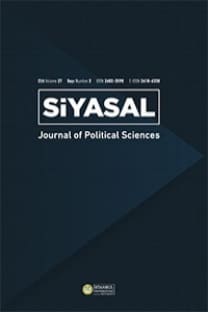Politicization of Migration Policies in the Visegrad Group’s Member States: A Means of Creating External Enemies of the Political system?
Visegrad Group – migration policy – politicization – V4 – migrants
Politicization of Migration Policies in the Visegrad Group’s Member States: A Means of Creating External Enemies of the Political system?
Visegrad Group, Migration policy, Politicization, V4 Migrants,
___
- An anti-corruption campaigner triumphs in Slovakia (2020). The Economist. https://www.economist.com/europe/2020/03/05/an-anti-corruption-campaigner-triumphs-in-slovakia (25.06.2022).
- Anguko, A. (2019), ‘Process tracing as a methodology for evaluating small sample size interventions’, eVALUation matters, 2(2), 18-27.
- Bäcker, R.; Rak, J. (2022), ‘Poland: Drift towards quasi-militant democracy in defiance of resistance’ in
- Bäcker, R.; Rak, J. (eds). Neo-militant democracies in post-communist member states of the European Union. London and New York: Routledge.
- Central Europe takes stand against illegal immigration (2021). Visegrad Post. https://visegradpost.com/en/2021/09/10/central-europe-takes-stand-against-illegal-immigration/ (22.06.2022).
- Cienski, J. (2016). Poland slams door on refugees. Politico. https://www.politico.eu/article/poland-slams-door-on-refugees-beata-szydlo/ (20.06.2022).
- Country report: Hungary (2021). Hungarian Helsinki Committee. https://asylumineurope.org/wp-content/uploads/2022/04/AIDA-HU_2021update.pdf (20.06.2022).
- Czech Government’s Migration Policy Principles (2022). Ministry of the Interior of the Czech Republic, https://www.mvcr.cz/mvcren/article/the-czech-government-s-migration-policy-principles.aspx (6.06.2022).
- Czech PM says ‘no place’ for Afghan refugees in Europe (2021). Euractiv. https://www.euractiv.com/section/global-europe/news/czech-pm-says-no-place-for-afghan-refugees-in-europe/ (22.06.2022).
- Czech Republic rejects UN migration pact (2018). Deutsche Welle. https://www.dw.com/en/czech-republic-rejects-un-migration-pact/a-46286574 (22.06.2022).
- D’Amato, G.; Ruedin, D.; van der Brug, W.; Berhout, J. (eds) (2015). The Politicisation of Migration. Abingdon/New York: Routledge.
- Drinóczi, T.; Mészáros, G. (2022), ‘Hungary: An abusive neo-militant democracy’ in Bäcker, R.; Rak, J. (eds). Neo-militant democracies in post-communist member states of the European Union. London and New York: Routledge.
- Gabrizova, Z. (2016). Slovak PM: ‘It’s impossible to integrate Muslims.’ Euractiv. https://www.euractiv.com/section/central-europe/news/slovak-pm-it-s-impossible-to-integrate-muslims/ (22.06.2022).
- Governance of migrant integration in Hungary (2022). European Commission. https://ec.europa.eu/migrant-integration/country-governance/governance-migrant-integration-hungary_en (20.06.2022).
- Governance of migrant integration in Poland (2022). European Commission. https://ec.europa.eu/migrant-integration/country-governance/governance-migrant-integration-poland_en (20.06.2022).
- Hungary asylum restrictions broke European law, says top EU legal adviser (2021). France 24. https://www.france24.com/en/europe/20210226-hungary-asylum-restrictions-broke-european-law-says-top-eu-legal-adviser (21.06.2022).
- Hungary: Population, demographic situation, languages and religion (2021). European Commission. https://eacea.ec.europa.eu/national-policies/eurydice/content/population-demographic-situation-languages-and-religions-35_en (20.06.2022).
- Hungary’s migration strategy (2014). European Commission. https://ec.europa.eu/migrant-integration/library-document/hungarys-migration-strategy_en (20.06.2022).
- Hungary’s Orban proposes to ban migrants for two years (2021). InfoMigrants. https://www.infomigrants.net/en/post/32900/hungarys-orban-proposes-to-ban-migrants-for-two-years (21.06.2021).
- Hungary to defy EU court ruling over migration policy, Orban says (2021). Reuters. https://www.reuters.com/world/europe/hungary-defy-eu-court-ruling-over-migration-policy-orban-says-2021-12-21/ (21.06.2022).
- Hutter, S. (2021) ‘Politicising immigration in times of crisis,,’ Journal of Ethnic and Migration Studies, 48(2), pp. 341-365.
- Jurečková, A. (2020). Czechs and migration: Solidarity lost in transformation. Heinrich Böll Stiftung. https://cz.boell.org/en/2020/10/12/czechs-and-migration-why-cant-we-get-any-solidarity (22.06.2022).
- Lauwers, N. (2021) ‘The Politicization of the Migration–Development Nexus: Parliamentary Discourse on the European Union Trust Fund on Migration,’ Journal of Common Market Studies, 59(1), 72-90.
- Majority of Poles oppose the admission of migrants from Polish-Belarusian border (2021). European Commission. https://ec.europa.eu/migrant-integration/news/majority-poles-oppose-admission-migrants-polish-belarusian-border_en (19.06.2022).
- Majority of Poles support state of emergency on Belarus border (2021). Notes from Poland. https://notesfrompoland.com/2021/09/09/majority-of-poles-support-state-of-emergency-on-belarus-border/ (18.06.2022).
- Meyers, E. (2004). ‘A Theory of Immigration Policy.’. In: Meyers, E. (ed.). International Immigration Policy: A Theoretical and Comparative Analysis. New York: Palgrave Macmillan.
- Migrants should be returned to their home countries, Czech PM says (2020). Reuters. https://www.reuters.com/article/us-europe-migrants-visegrad-czech-idUSKCN26F1SQ (22.06.2022).
- Migration in Slovakia (2022). International Organization for Migration, https://www.iom.sk/en/migration/migration-in-slovakia.html#:~:text=Today%20the%20foreigners%20make%20up,means%20an%20increase%20of%2011.7%25 (20.06.2022).
- Muller, R. (2021). Seeking re-election, Czech PM pledges to keep migrants, Brussels at bay. Reuters. https://www.reuters.com/world/europe/seeking-re-election-czech-pm-pledges-keep-migrants-brussels-bay-2021-09-02/ (22.06.2022).
- Poland says border crisis 'greatest' bid to destabilize Europe since Cold War (2021). VOA. https://www.voanews.com/a/poland-says-border-crisis-greatest-bid-to-destabilize-europe-since-cold-war/6321788.html (20.06.2022).
- Poland unveils results of 2021 census (2022). Radio Poland. https://www.polskieradio.pl/395/7789/Artykul/2964668,Poland-unveils-results-of-2021-census (20.06.2022).
- Polish PM rejects EU ‘blackmail’ on migrant quotas (2017). Euractiv. https://www.euractiv.com/section/justice-home-affairs/news/polish-pm-rejects-eu-blackmail-on-migrant-quotas/ (20.06.2022).
- Samuels, W.J. (1980) ‘Two Concepts of Politicization,’ Social Science, 55, pp. 67-70.
- Simon, B.; Grabow, O. (2010) ‘The Politicization of Migrants: Further Evidence that Politicized Collective Identity is a Dual Identity,’ Political Psychology, 31(5), pp. 717-738.
- Situation of foreigners, migration and integration in the Czech Republic (2020). European Commission. https://ec.europa.eu/migrant-integration/library-document/situation-foreigners-migration-and-integration-czech-republic-2020_en (20.06.2022).
- Skrzypek, M. (2022), ‘Czech Republic: Towards quasi-militant democracy?’ in Bäcker, R.; Rak, J. (eds). Neo-militant democracies in post-communist member states of the European Union. London and New York: Routledge.
- Slovakia: Parliamentary elections (2020). Center for Strategic and International Studies (CSIS). https://www.csis.org/programs/european-election-watch/slovakia (28.06.2022).
- Slovakia adopts new migration policy (2021). European Commission. https://ec.europa.eu/migrant-integration/news/slovakia-adopts-new-migration-policy_en (20.06.2022).
- Slovakia’s populist opposition wins parliamentary election (2020). The Times of Israel, https://www.timesofisrael.com/slovakias-populist-opposition-wins-parliamentary-election/ (25.06.2022).
- Steuer, M. & Kovanic, M. (2022), ‘Militarisation of democracy in Slovakia’ in Bäcker, R.; Rak, J. (eds). Neo-militant democracies in post-communist member states of the European Union. London and New York: Routledge.
- Temizisler, S. (2022) ‘Politicisation of migration issues during the refugee crisis in the UK and Denmark,’ Journal of Contemporary European Studies, DOI: 10.1080/14782804.2022.2031133.
- The safety of Poland comes first – state of emergency near the border with Belarus (2021). The Chancellery of the Prime Minister. https://www.gov.pl/web/primeminister/the-safety-of-poland-comes-first--state-of-emergency-near-the-border-with-belarus (20.06.2022).
- Wintour, P. (2018). Migrants to Europe 'need to go home', says Czech prime minister, “The Guardian,” https://www.theguardian.com/world/2018/oct/25/europe-migrants-need-to-go-home-says-czech-prime-minister (22.06.2022).
- Viktor Orban's most controversial migration comments (2018). Deutsche Welle. https://www.dw.com/en/viktor-orbans-most-controversial-migration-comments/g-42086054 (21.06.2022).
- Viner, K. (2015). Czech president: migrants should be fighting Isis, not 'invading' Europe. The Guardian. https://www.theguardian.com/world/2015/dec/27/czech-president-migrants-should-be-fighting-isis-not-invading-europe (22.06.2022).
- Zogata-Kusz, A. (2012). Theoretical perspectives on immigration policy and politics. Contemporary European Studies, 1(1), 5-21.
- Zürn, M. (2019). Politicization compared: at national, European, and global levels. Journal of European Public Policy, 26(7), 977-995.
- Yayın Aralığı: Yılda 2 Sayı
- Başlangıç: 1983
- Yayıncı: İstanbul Üniversitesi
Marc SMYRL, Ceren ARK YILDIRIM
Etnik Ayrımcılığın İnsan Ticaretini Önleme Üzerine Etkisi
Bengi DEMİRCİ, Nilüfer GÜRER BİLDİK
Social Networks and Democracy: Problems and Dilemmas of Regulating the Digital Ecosystem
Crisis and Corruption in Spain: Improving the Quality of Governance to Fight Corruption
Türkiye’de Belediyelerin Karar Alma Süreçlerine STK’ların Aktif Katılımının Ölçülmesi
